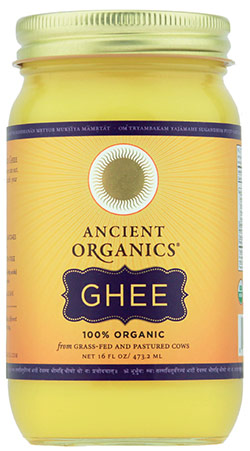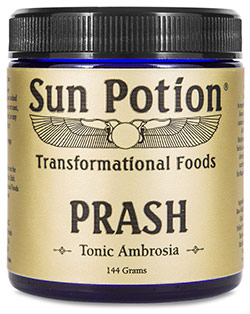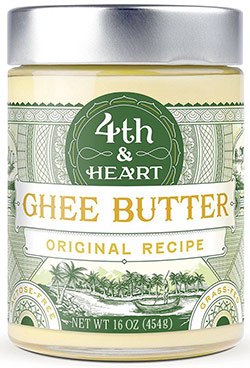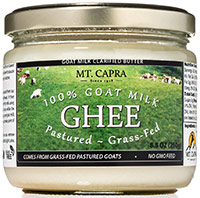The Benefits of Ghee:
7 Health-Boosting Properties of the Delicious Ancient Superfood Clarified Butter
BY JUSTIN FAERMAN
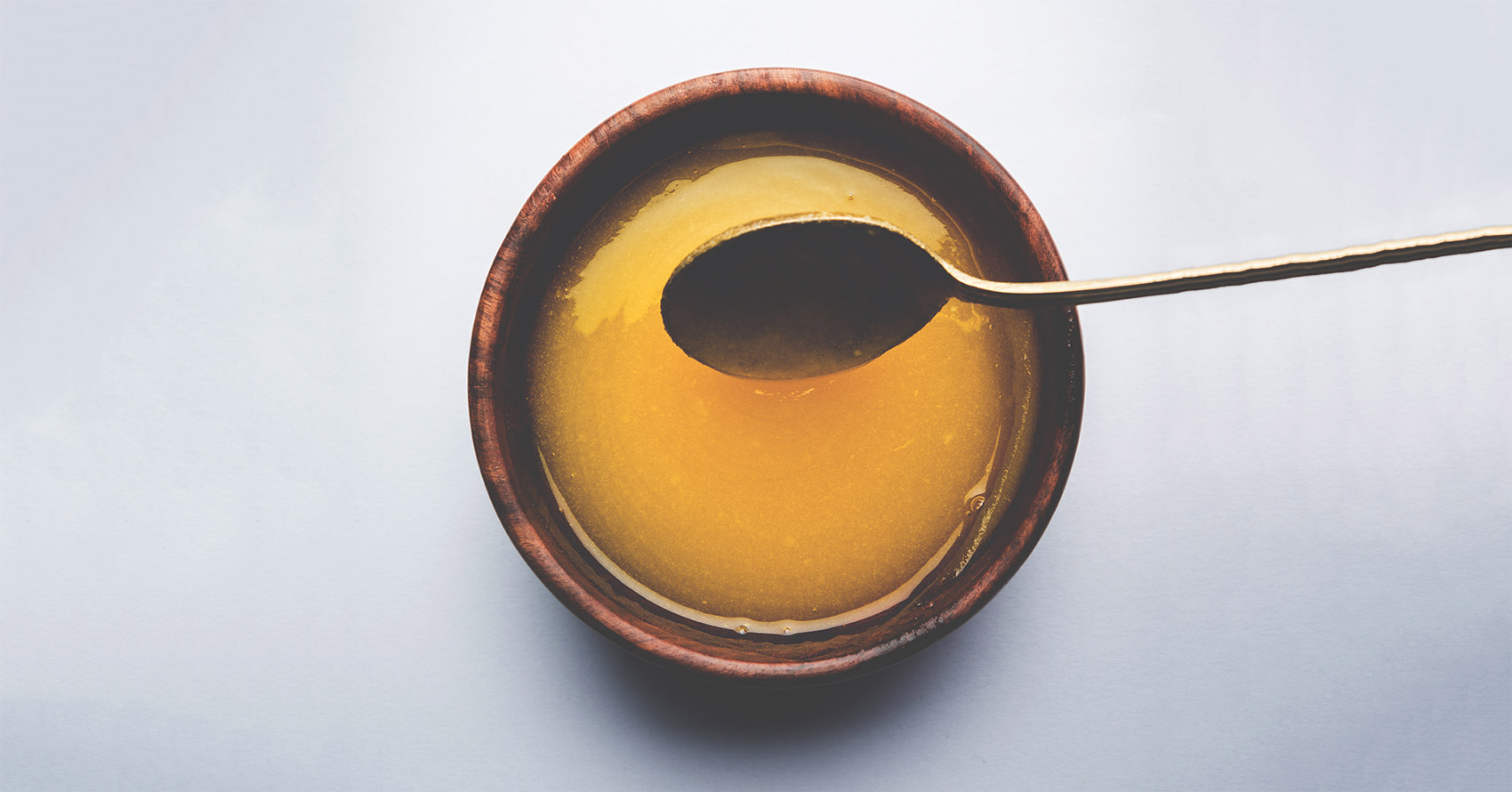
Ghee is one of those special superfoods that gives you the best of both worlds: it’s deeply rejuvenating, powerfully health-boosting and has out-of-this-world flavor. It should come as no surprise that it has been revered as a prized food in India for thousands of years. In fact, many Ayurvedic practitioners consider ghee to be such a supreme health tonic that it is often recommended, in small doses, as the first food given to a newborn child, even before breast milk [1]
in order to help kick start digestion, seed the body with life force (or ojas) and supply deeply nourishing nutrients for building a healthy brain and nervous system. But those incredible health benefits don’t just apply to newborn children—ghee is a wonderful health-boosting tonic at any age, the benefits of which affect nearly every system and process in the body.But before we dive into that, let’s first get clear on exactly what ghee is: clarified butter. Clarified butter is essentially butter that has been lightly simmered on a stovetop, the process of which causes the milk fats, water and other impurities to separate out to the top and bottom of the pan. These are then filtered out removing the lactose and leaving the highly purified, medicinal oil known as ghee, which solidifies at room temperature.
Ghee vs. Butter: Losing the Casein and Lactose, Gaining Incredible Health Benefits
The process of clarifying butter into ghee changes it from a delicious, nutritious fat into an incredibly tasty, highly medicinal powerhouse due to the concentrating and purifying effect clarification has on the butter. Ghee is literally all of the best parts of butter without any of the troublesome allergens like casein and lactose. The process of simmering the butter and filtering out the sediments and milk solids removes 99% of the lactose and casein, meaning that even those who are lactose and casein intolerant/sensitive can often eat ghee without any issue. With that being said, if you have one of these allergies, start slowly with ghee to see how your body reacts, just to be on the safe side.
The Health Benefits of Ghee
While the term superfood is thrown around pretty loosely these days, ghee’s benefits truly live up to the hype—from the brain, to the digestive tract and beyond, this ancient nourishing fat truly rejuvenates the body from the inside out.
1. Nourishes and Protects the Brain
Few people realize that saturated fat is essential for proper brain health and ghee is one of the highest-quality and healthiest sources of saturated fat available. For starters, neurons and nerve fibers in the brain are largely coated in myelin sheathing, which, you guessed it, is largely composed of saturated fats like those found in ghee. The myelin sheathing helps neurons, axons and nerve cells fire and communicate properly, which they can’t do when our diet is lacking high-quality saturated fats. Furthermore, saturated fat is a fundamental building block for brain cells and it is certainly interesting to consider that one of the richest sources of saturated fat in nature is human breast milk, clearly showing its role in the development of a healthy brain.
Ghee is also rich in cholesterol, another vitally important brain-boosting nutrient that has been wrongly demonized by the media for years. According to Dr. David Perlmutter, functional medicine doctor and author of Grain Brain, cholesterol is essential for not only proper brain function but also preventing disease:
“Cholesterol is vital for a well-functioning brain. Cholesterol functions as a brain-protective antioxidant. It is the raw material from which our bodies make vitamin D, a fundamental player in preserving brain function. In addition, cholesterol is the precursor for the sex hormones estrogen, progesterone and testosterone¾all of which contribute to healthy brain function. While the brain constitutes about 2-3% of our total body weight, an impressive 25% of the body’s cholesterol is found in the brain. So when the FDA last year began requiring consumer warnings on certain cholesterol-lowering medications related to memory decline and other cognitive issues, it wasn’t surprising. Indeed, it has now been shown that in the elderly, those folks whose cholesterol levels are the highest may have as much as a 70% risk reduction for dementia.” [2, 3]
And if all that wasn’t enough, ghee also contains choline and omega-3 fatty acids, both incredibly important brain nutrients. Choline also acts as a precursor to essential neurotransmitters like acetylcholine, which plays an important role in memory and learning. A choline deficiency can result in poor concentration, poor memory, mood changes and other cognitive impairments, especially as someone ages. Omega-3 fatty acids have a number of important roles in brain health, from increasing neurotransmitter production to reducing inflammation to increasing gray matter to slowing the rate of aging and improving cognitive health, memory and overall mood and wellbeing. [4]
2. Heals and Repairs Digestion and the Digestive Tract
When it comes to healing and improving digestion, there are few substances on the planet as powerful as ghee for a number of reasons.
The first is that ghee is one of nature’s richest sources of butyrate (butyric acid), a short-chain fatty acid that causes intestinal wall cells to proliferate, meaning that it essentially causes the growth and repair of new tissues in the digestive tract. [5] This has a number of benefits, from protection against colon cancer to the repair of leaky gut syndrome, IBS, ulcers, ulcerative colitis and Crohn’s disease, among other things. [6] Toxins, gluten, antibiotics and other allergens and pollutants enter our digestive tract through our food and medicines and can damage the intestinal lining over time, causing scarring and holes in the intestinal wall. The butryic acid in ghee (when consumed regularly) works to reverse this damage and restore a healthy colon by soothing and reducing inflammation in the digestive tract and healing wounds in the mucus lining of the stomach and intestines.
Butyric acid is also balancing and strengthening to the gut flora (probiotic bacteria), is beneficial for reducing Candida overgrowth and other unwanted pathogens and balances hydrochloric acid levels in the stomach, which are frequently disturbed in those with digestive problems [7]. Even if you don’t have any major gut issues, ghee can strengthen digestion to new levels, improving nutrient absorption and overall health.
The Enteric Nervous System: The Brain in Your Belly
Most people are not aware that a major portion of our nervous system is located in our intestines, also know as the “enteric nervous system” by doctors or, more commonly, as our “second brain.” In fact, more than 90% of the body’s serotonin is produced in the gut, as well as about 50% of the body’s dopamine. Furthermore, your intestines produce and co-regulate 30 other neurotransmitters identical to those found in your brain that are used by your central nervous system to regulate mood, stress levels, sleep patterns, mental functioning and any number of other essential body processes.
As you can imagine, an imbalanced, damaged or poorly functioning digestive system—whether that is due to antibiotic use, diet and lifestyle or simply overconsumption of irritating foods—interferes with the functioning of this second brain and has been implicated in depression (and other mood disorders), immune system disruption and many other common diseases. In that sense, ghee also works to nourish, protect and strengthen the brain in your belly as well. Many people notice many of the above-mentioned benefits from regularly consuming ghee as a medicinal tonic.And if that wasn’t enough, ghee also stimulates and renews bile production in the liver, which is extremely important for proper digestion, particularly the digestion of fatty foods. [8]
3. Rich in Essential, Health-Boosting Vitamins, Minerals and Nutrients
In addition to all of its medicinal benefits, ghee is also rich in some harder-to-get essential nutrients:
Vitamin A
Unlike most foods, the Vitamin A in ghee is in retinol form, meaning that it is in the most biocompatible form for the human body. Most of the vitamin A in our diets comes from beta-carotene, which requires the body to convert it into retinol before it can be used. However, not everyone converts beta-carotene into retinol form as efficiently, and some people run the risk of mild-to-moderate vitamin A deficiencies if there is not enough retinol-form vitamin A in their diets. Vitamin A is important for eye, skin, hair and immune health among other things.
Vitamin E
Ghee contains high amounts of vitamin E, one of the most powerful and important antioxidants in the human body.
Vitamin K2
Essential for healthy bones and heart, vitamin K2 can be hard to get, as it is somewhat rare in most foods, but ghee is rich in it. Proper levels of vitamin K2 help to protect against tooth decay, support proper growth and development of bones, and protect against the calcification of the arteries, also known as atherosclerosis.
Cholesterol
Despite being demonized by the media in past decades, cholesterol is essential for proper health, hormone production, brain function, nerve function, cellular health and a number of other highly important bodily functions, the consumption of which does not cause heart disease and blood clots as previously thought. Ghee supplies high-quality cholesterol to the body and brain.
Omega-3 and Omega-9 Fatty Acids
As long as it is from grass-fed cows, ghee contains omega-3 and omega-9 fatty acids, which play a number of vital roles in the human body and are particularly important for mood and brain health, among other things.
Conjugated Linoleic Acid (CLA)
Abundant in ghee made from grass-fed cows’ milk, initial studies indicate that CLA may help to reduce tumors, lower cholesterol and high blood pressure, reduce inflammation and actually burn body fat.
4. Rich in Ojas: Increases Life Force and Deeply Rejuvenating to the Mind, Body and Spirit
Of all the benefits of ghee, perhaps the most important is its ability to increase life-force energy in the body. According to the ancient Indian system of medicine known as Ayurveda, ghee supplies the body and mind with ojas, which loosely translates to “vitality” or “life force.” In Ayurvedic philosophy, ojas is a primordial life energy that we all possess that keeps us alive and healthy but can be depleted by age, stress, poor diet/nutrition, sexual excess, toxins and more. Ayurvedic doctors believe that certain building foods and herbs, such as ghee, can resupply the body with ojas if it has been depleted or “top it up” in the case of those who are looking to further strengthen their already good health.
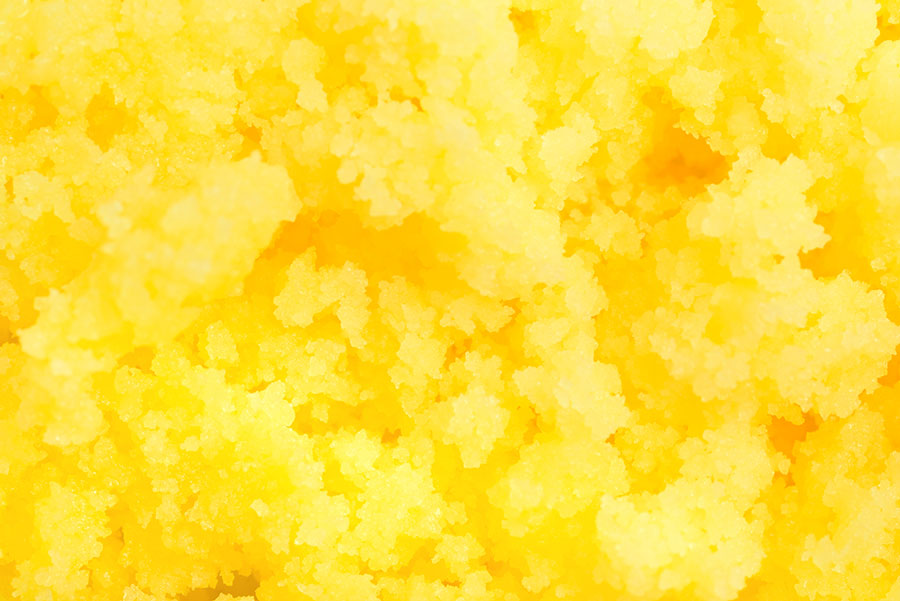
Jing energy, which ghee also supplies, is similar in many ways to ojas. According to Daoist philosophy, jing is the deepest and most fundamental aspect of our energy. It governs the gradual processes of development and aging. Ghee can be classified as a jing-enhancing food in the Daoist herbal tradition, which means that it is nourishing at the most fundamental levels to the body, mind and spirit.
5. Physically, Energetically and Emotionally Calming and Nourishing
In Ayurvedic medicine, ghee is said to be tri-doshic in smaller doses, meaning that it restores balance and harmony and tends to calm (pacify) all body types (or constitutions). For people of a skinny (vata) and medium build (pitta), ghee in small to large doses is generally calming and relaxing both physically, emotionally and energetically. For those of a larger or heavier build (kapha), ghee is best taken in smaller quantities for maximum benefit, as it can calm an otherwise sluggish metabolism too much. For this reason, ghee can be taken at night just before bed to help drift off into a pleasantly deep sleep. It is also great in combination with more stimulating, hot and spicy foods like peppers of all kind, ginger and garlic, which it helps to balance out.
6. Great for Cooking: High Smoke Point and Tastes Great
Ghee makes a great cooking oil for almost any type of food by any method. It can handle heat up to 450 degrees Fahrenheit (232 Celsius) and imparts a rich, buttery flavor. As a saturated fat, ghee is also more stable than other fats/oils, thus it is less prone to oxidation and nutrient destruction during cooking. Best of all, because it contains virtually no milk solids, ghee stays good almost indefinitely. It can be stored at room temperature or in the fridge—simply be sure to keep moisture and water out of the jar.
7. Detoxifying Physically and Emotionally
In Ayurveda, ghee has traditionally been used as a detoxifying agent on the physical and emotional levels. According to Certified Ayurvedic Practitioner and chiropractor Dr. John Douillard:
“Ghee has a lipophilic effect on other fatty acids and fatty toxins in the body (which are lipophilic, meaning they are attracted to other fats), acting like a chelating agent to pull stored fat-soluble toxins out of the body and back into the intestines for removal from the body. Molecules of emotion—which, according to Ayurveda, are also lipophilic and stored in the fat cells—can also be “pulled” out of their hiding places using this method.”
Ghee also helps to lubricate the body and intestines, helping with constipation and promoting regular bowel movements in healthy individuals, which assists in elimination and detoxification. It has traditionally been used in panchakarma treatments (a special Ayurvedic cleansing ritual) to remove deep-rooted physical and mental toxins. It is considered to be a vital step in the preparatory phase (purvakarma) of the cleanse, as well as during the cleanse itself. By taking ghee in large doses prior to the cleanse, it “loosens” the deep-rooted toxins from the tissues, which allows them to be eliminated through purgation.
What to Look for When Buying Ghee
The most important consideration when buying ghee is that it comes from 100% grass-fed, pasture-raised cows. If it is also organic or biodynamic, that is an added plus. However, so long as the cows are raised by traditional methods (grass-fed and pastured), the ghee product will generally be of high quality. Ghee should always be packaged in glass jars for maximum freshness and potency.
Recommended Ghee Products
Organic Grass-Fed Ghee
Ancient Organics
Ancient Organics offers an artisan-quality grass-fed, organic ghee churned in small batches by hand according to ancient Ayurvedic principles. Honoring the tradition of artisan ghee making in India, Ancient Organics is produced in a peaceful and mantra-infused kitchen, and they offer a special line of full moon prepared ghee for an extra energetic and spiritual lift.
Prash Tonic Ambrosia Ghee
Sun Potion
Sun Potion Prash is inspired by the Ayurvedic formula Chyawanprash, which is a highly medicinal and delicious blend of wildflower honey and various tonic herbs for improving digestion and overall health and wellness infused in a base of biodynamic ghee.
New Zealand Grass-Fed Ghee
4th & Heart
4th & Heart offers a 100% grass-fed ghee prepared from free roaming, humanely raised and pastured New Zealand cows, widely considered to be some of the best treated cows on the planet. 4th & Heart also offers a range of ghee butters infused with medicinal, culinary ingredients such as vanilla beans, truffles, himalayan pink salt and more.
Mt. Capra Goat’s Milk Ghee
Mt. Capra
Mt. Capra offers a truly one-of-a-kind goats milk ghee sourced from pasture-raised, grass-fed goats. Goat’s milk is more easily digestible than cows milk and less allergenic making their ghee a good choice for sensitive individuals, although as milk products go, ghee tends to be very mild and non-problematic even in those people with lactose intolerance.
How to Use Ghee
Ghee tastes phenomenal and has a variety of uses as follows:
+ Eat it straight out of the jar for a calming and nourishing medicinal snack
+ Ghee can be used in place of most cooking oils and is great for sauteeing
+ A classic use is on toast or bread as substitute for butter
+ In baking recipes as a substitute for butter
+ As a skin lotion for moisturizing deeply
+ Medicinally as prescribed by Ayurveda
Side Effects and Interactions
Ghee has no side effects and is extremely safe but should be avoided by people with extreme dairy allergies. If you fall in this camp, contact your doctor or naturopath before consuming ghee.
About The Author
Justin Faerman has been studying and writing about holistic health practices, herbalism and natural medicine for over 14 years and is a leading authority on both modern and ancient therapies for creating lasting health and wellness. He has a degree in Environmental Science from the University of California, Santa Barbara and has conducted field research into organic and regenerative agriculture practices and eco-social sustainability during his time there. He is also the Founder of Lotus Superfoods, a boutique purveyor of rare herbs and superfoods as well as the Co-founder of Conscious Lifestyle Magazine and the Flow Consciousness Institute. Learn more about his work at flowconsciousnessinstitute.com and lotussuperfoods.com






